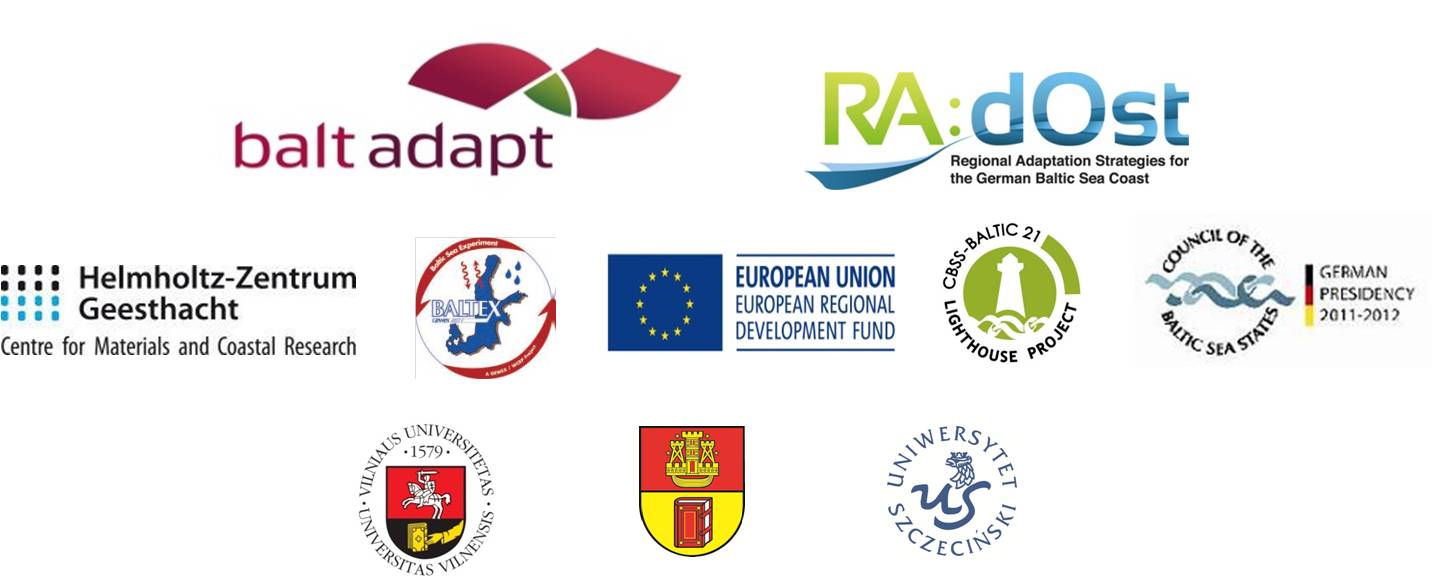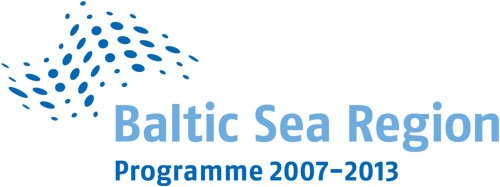Gdansk 25.10.2011
The second workshop of the series took place as a side event to the 13th Baltic Development Forum Summit.
After introductory remarks from Dörte Ratzmann (BMU) and Grit Martinez (Ecologic Institute), the participants briefly introduced themselves. The Polish side was represented by participants from the Environmental Office of the City of Gdansk (www.gdansk.pl/) and the Maritime Office in Gdynia. In addition to the project workers from Baltadapt, RADOST, and Circum Mare Balticum, a representative from the German Institut Infrastruktur & Umwelt was in attendance. A presentation of Geodomes was given after the workshop as a special event; the interactive presentation was developed by a Swedish meteorological and hydrological institute, SMHI, to provide information about climate change in the Baltic Sea area. Therefore, representatives from the Univeristy Linköping and SMHI were also at the workshop.
The opening speech by Franziska Stuke (Ecologic Institute) about the goals of the Baltadapt project and the presentations by Grit Martinez (Ecologic Institute) and Dennis Bray (HZG) about the perception of climate scientists and regional decision makers in the Baltic region were followed by a lively discussion between the workshop’s participants.

Just like in Stettin, the discussion in Gdansk made clear that climate adaptation and protection have not made it high on the list of priorities. A representative from the City of Gdansk, Maciej Lorek, stated that, from the viewpoint of the Environmental Office, when compared to water and air quality, energy security, and the conservation of the Vistula delta, climate protection and adaptation are rather a low priority—at least for the administration of the City of Gdansk.
The Maritime Office in Gdynia recognizes the expected effects of climate change, and working groups are dealing with questions regarding the effects of sea level rise and coastal erosion. Even the concerns of the tourism industry are being taken into account by the Maritime Office. The question of changing precipitation patterns and freshwater intrusion into the Baltic Sea are also current research topics. Nature conservation is a responsibility of the office; however, Andrzej Cieślak, an employee of the Office, asks whether natural processes of simply the status quo of the environment should be protected. Occasionally, and especially on the coast, these two goals can be irreconcilable. In summary, the Maritime Office is handling the problem of climate change not as an individual topic but rather integrated into its other areas of work. Cieślak also states, that for coastal zones climate change effects are included into the Polish strategy for coastal protection. This strategy is endorsed by the Polish Parliament (the Sejm) and is backed up by a relevant Bill on implementation of the long term program for coastal protection. The strategy contains a set of measures including not only simple building of coastal defense structures, but also requirements concerning spatial management and general building standards within areas of risk, which take into account climate change. Since these requirements are mainly implemented/supervised by the maritime administration, the other, especially local, administrations are not so much concerned with climate change (sea level rise and increased risk of landslides on coastal cliffs) issues.
It is imperative to communicate information about climate change in a “clear, reliable, and readable” (Cieślak) manner in order to pass it along to all interested parties of the general public. To that extent, the communicators of this information should often be scientists instead of ministries or other authorities. This recommendation is based on the great credibility that scientists enjoy and their ability to reliably handle sensitive data. The media should not produce only sensationalized climate stories and should keep the reporting about climate change as objective as possible. For this to happen, however, it is necessary for scientists to prepare climate data in such a way that they are easily understandable for journalists and that nothing is lost in the translation from scientific journals to mass media stories.
The interactive presentation of Geodomes regarding eutrophication in the Baltic Sea marked the end of the workshop at the thirteenth Baltic Development Forum in Gdansk.
Stuke - BALTADAPT Overview of existing (regional) adaptation strategies and action plans
Bray - Climate Science in the Baltic Coastal Region: Quality Assessment and Communication
Anderson - Visualization in the Geodome
Announcement
Warsztaty po tytułem: „Informacje o klimatycznych zmianach regionu Morza Bałtyckiego dla przedstawicieli władz komunalnych i urzędów”
w imieniu Uniwersytetu Szczecińskiego oraz Niemieckiego Ministerstwa Środowiska, Ochrony Przyrody i Bezpieczeństwa Nuklearnego w Berlinie mamy zaszczyt zaprosić Państwa na warsztaty pod nazwą: „Informacje o klimatycznych zmianach regionu Morza Bałtyckiego dla przedstawicieli władz komunalnych i urzędów”, organizowane 25 października 2011 roku w Gdańsku.
Pośród przedstawicieli gmin i miejscowości nadbałtyckich mnożą się wątpliwości związane z globalnymi zmianami klimatycznymi. Wzrost poziomu morza wywołujący ekstremalne zjawiska pogodowe oraz zmiany w bioróżnorodności morskich i nadbrzeżnych ekosystemów są jednym z wielu nowych problemów, z którymi muszą zmierzyć się przedstawiciele nadmorskich ośrodków komunalnych.
Organizowane przez nas warsztaty dadzą Państwu rzadką okazję zapoznania się zarówno z charakterystycznymi zmianami środowiskowymi, jak i perspektywami adaptacji do zmian klimatycznych polskiego wybrzeża. Nasze spotkanie organizowane jest w kooperacji z Ecologic Institute (Berlin) oraz Helmholtz Center Geesthacht z Niemiec.
Organizowane warsztaty pozwolą przedstawicielom lokalnych samorządów na przedyskutowanie kluczowych zagadnień dotyczących adaptacji do zamian klimatycznych w regionie nadbałtyckim z gronem międzynarodowych ekspertów. W ramach warsztatów przedstawimy Państwu szereg praktycznych rozwiązań dotyczących wdrażania zabiegów adaptacyjnych oraz zaprezentujemy rozwiązania w jaki sposób (w roli lokalnych ośrodków decyzyjnych) mogą Państwo przygotować własne gminy na następstwa zmian klimatycznych.
Bylibyśmy zaszczyceni, gdybyśmy mogli powitać Państwa na organizowanej przez nas imprezie i prosimy o zarezerwowanie czasu na wzięcie udziału w warsztatach organizowanych 25 października w Gdańsku. Zapewniamy Państwu zwrot kosztów podróży. Oficjalne zaproszenie oraz więcej szczegółowych informacji organizacyjnych nadeślemy w przeciągu najbliższych dwóch tygodni.
Z wyrazami szacunku:
Dr Grit Martinez, Ecologic Institute Berlin
RADOST oraz Circum Mare Balticum Project
Dörte Ratzmann, niemieckie Federalne Ministerstwo Środowiska, Ochrony Przyrody i Bezpieczeństwa Nuklearnego
Projekt BALTADAPT
Program
Dostęp do programu warsztatów [107 KB]
Rejestracja
Aby dokonać rejestracji, prosimy o wypełnienie formularza rejestracyjnego
Miejsce odbycia warsztatów:
Hotel Gdańsk
ul. Szafarnia 9
80-755 Gdańsk
Kliknij tutaj, aby zlokalizować miejsce zdarzenia.
Announcement: Workshop on “Climate knowledge for regional coastal stakeholders in the eastern Baltic Sea region", 25 October 2011, Gdansk
On behalf of the University of Szeczin and the German Ministry for the Environment, Nature Conservation and Nuclear Safety (Berlin), we have the honour to invite you to our Workshop on “Climate knowledge for regional coastal stakeholders in the eastern Baltic Sea region", which will take place on 25 October in Gdansk.
Communities on the Baltic Sea face increasing challenges due to global climate change. Sea level rise, increasingly extreme weather events, and changing patterns of coastal and marine biodiversity are just a few of the many impacts that stakeholder in coastal communities must face.
The workshop offers a unique opportunity to explore the specific challenges and opportunities for climate change adaptation at the Polish coast. The event will be co-convened by Ecologic Institute (Berlin, Germany) and Helmholtz Center Geesthacht (Germany).
This workshop will bring local political decision makers and international experts to discuss key questions about adaptation to climate change in the Baltic Sea Region. The workshop is intended to provide you with useful information on the implementation of adaptation measures and also how to prepare as a decision maker to climate change within your community.
We would be very pleased to welcome you at this event so please save the date for your participation on 25 October in Gdansk. Your travel expenses will be covered. We will provide you with an official invitation and more detailed information about this event within the next two weeks.
Kind regards,
Dr. Grit Martinez, Ecologic Institute Berlin
RADOST and Circum Mare Balticum Project
Dörte Ratzmann, Federal Ministry for the Environment, Nature Conservation and Nuclear Safety
BALTADAPT project
Programme
You can download here the programme of the event [107 KB]
Registration
To register for the event, please fill the registration form
Workshop Location
The Workshop event will take place at :
Hotel Gdańsk
ul. Szafarnia 9
80-755 Gdańsk
Please, click here to locate the event venue.




